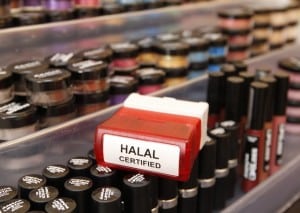By The Halal Journal Team
Original Article Source: The Halal Journal May/June 2009
The Halal Journal interviews Dr Mah Hussain-Gambles[1],
founder of Saaf Pure Skincare (a UK-based eco-ethical skincare range,
which is both Organic and Halal certified) about her views on the
recent European Union (EU) ban on animal testing on cosmetics and the
role of Humane Cosmetics Standard[2] (HCS).
“I wholeheartedly welcome the
recent EU ban on animal testing on cosmetics and hope that the rest of
the world follows. We at Saaf are very proud to display the ‘Leaping
Bunny’ logo on all of our packaging and signing up to HCS,” said Dr.
Mah.
The BUAV[3]
is the UK’s leading organisation peacefully campaigning to end
cosmetics testing on animals across the world. Working with corporate
partners, international governments and regulators worldwide, the BUAV
uses scientific and legislative expertise to create change. The BUAV
operates the HCS symbolised by the globally recognised ‘Rabbit and
Stars’ (‘Leaping Bunny’) logo. Companies sign up to the HCS to
demonstrate that animal testing has been removed from their supply
chain for cosmetic products and ingredients.
“With my background strongly
rooted in science and pharmacology, it took me years to realise that
testing cosmetic ingredients on animals is not only cruel, but also
obsolete and archaic. With recent developments in computer modelling,
human cell lines and other non-animal alternatives developed by
scientists worldwide, it also makes little commercial sense to use
animal for testing cosmetics when the alternative tests can be far
cheaper,” Dr. Mah affirmed.
In the EU, animal testing for
cosmetics is not required by law, and animal testing for both cosmetics
ingredients and finished products is banned (in the UK) since 1997. A
finished products ban has been in place in the EU since 11 September
2004.
Ingredients, however, can
continue to be animal-tested in the EU until 11 March 2009 when a ban
on both testing and sale of cosmetic ingredients comes into force
within the EU. There are however, three types of animal tests which are
exempted from the sales or ‘marketing’ ban, because there is an
extended deadline (until 11 March 2013 at the latest) to allow
alternative testing methods to be validated. Wherever a validated
non-animal alternative testing method exists, the animal equivalent
cannot be used.
Given the extended deadline for
full implementation of the ban, it is therefore likely that most
cosmetic brands contain animal-tested ingredients and even where
non-animal testing claims are made; unless a company signs up to the
HCS and adopts and rigorously polices a ‘fixed cut-off date’ (FCOD), it
is impossible to tell whether a claim carries much meaning. This
reinforces the continued need for the HCS as a genuine cruelty-free
standard.
Dr Mah’s passion in
cruelty-free cosmetics is part of her bigger vision of spreading the
eco-ethical business model (and green beauty products) to the world.
“I am doing this by drawing
parallels between green policies in the West and Halal principles, as
laid out in the Quran fourteen hundred years ago. My message seems to
be receiving much global interest and I speak frequently on the topic:
‘Halal, the new eco-ethical model’. The principles of Halal, as
originally laid out in the Quran, include Corporate Social
Responsibility, recycling, not harming the human body, caring for the
environment and not being cruel to animals. These are ethics that I
believe can benefit all consumers and lead the industry in the right
direction,” said Dr Mah.
Islam is a deeply compassionate
religion, especially regarding animal welfare. Numerous verses in the
Holy Quran refer to the sanctity of animal life and the equal rights of
an animal to have a peaceful life.
“All creatures are like a
family (Ayal) of God; and He loves the most those who are the most
beneficent to His family,” affirmed Dr Mah.
The Prophet Muhammad’s
(p.b.u.h.) kindness to animals was remarkable for the social context of
his upbringing. The historian Montgomery Watt cites an instance of the
Prophet Muhammad (p.b.u.h.) posting sentries to ensure that a female
dog with newborn puppies was not disturbed by his army travelling to
Mecca in the year 630.
“There is no man who kills
[even] a sparrow or anything smaller…but Allah will question him
about it [on the judgement day],” and “Whoever is kind to the creatures
of God is kind to himself.”
Dr Mah emphasised, “The Quran
clearly outlines our responsibilities towards the animal kingdom.
Testing cosmetics and ingredients on animals is inhumane; and I speak
from personal experience in my role as a pharmacologist many years ago.
For the sake of personal vanity, do we really want the blood of
innocent animals on our conscience?”
[1] To view articles by Dr. Mah Hussain-Gambles, visit www.saafpureskincare.com
[2] For more information on HCS, visit www.gocrueltyfree.org
[3] For more information on BUAV, visit www.buav.org



